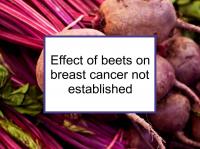Beets (Beta vulgaris), otherwise known as beetroot, are in the same family as Swiss chard and spinach. While the leaves may be eaten, the majority of this discussion refers to the tuber. Beets are a good dietary source of folate, manganese and fiber. Beets also contain alpha-lipoic acid and various betacyanins and polyphenols.
Beets have been shown to possess powerful antioxidant, anti-inflammatory, cholesterol lowering and liver protective activities. Beet extract has been shown to reduce esophageal, lung, skin and colon cancer in rats. One Chilean study found that men with lung cancer were less likely to consume beets, among other winter vegetables, than matched controls without lung cancer.
Whereas most other red fruits and vegetables contain anthocyanin pigments, the deep red color of beets is due to betalain pigments (betanin and ibetanin). Betalains have been shown to have powerful antioxidant activities, but few studies have evaluated their potential anti-cancer activities.
Breast cancer-related effects of eating beets
The beet pigment betanin has been shown to have a dose-dependent growth inhibition against breast cancer cells in the laboratory. On the other hand, a screen of Jordanian medicinal plants found that Beta vulgaris had no antiproliferative activity against human breast cancer cells, although it was not clear which part of the plant was tested.
One 2023 study found that betanin reduced the viability of triple negative (ER-/PR-/HER2-) breast cancer cells. Another study reported that beet juice reduced the toxic effects of doxorubicin in heart cells while increasing the cytotoxic effects of the chemotherapy in triple negative cells. However, beets are an abundant source of oxalate. Breast cells can also accumulate oxalate, resulting in calcium oxalate microcalcifications. While one study reported that oxalate appears to promote the transformation of breast cells from normal to cancer cells, this has not been confirmed.
Additional comments
One study found that combining anthocyanin and betanin neutralized the anti-cancer activities of both pigments in breast cancer cells, suggesting that beets and beet juice should be consumed separately from red cabbage, red onions and other dark red vegetables and fruits.
The oxalate found in beets can interfere with calcium absorption. Therefore beets should not be eaten at the same time as calcium-rich foods by breast cancer patients and others to whom calcium levels are important. Oxalate can also contribute to calcium oxalate kidney stones in susceptible individuals.Sugar beets were bred selectively from beets in the 19th century to have a high sucrose content (approximately 20 percent by weight). Most U.S. table sugar is made either from sugarcane or sugar beets. Borscht is a hot or cold beet soup popular in Central and Eastern European countries. Pickled beets are made by adding sugar, vinegar and other ingredients to cooked beets.
Sugar beet leaves have estrogenic properties. Cattle fed large amounts of sugar beet leaves have been found to have increased infertility and genital tract abnormalities. In addition, sugar beet leaf extracts injected subcutaneously increased uterine weights in mice (a sign of estrogenicity) in one study.
Sources of information in this webpage
The information above, which is updated continually as new research becomes available, has been developed based solely on the results of academic studies. Clicking on any of the underlined terms will take you to its tag or webpage, which contain more extensive information.
Note that while we are continually searching for new evidence concerning this food, there is not much interest in it among cancer researchers so few recent specific studies are available.
